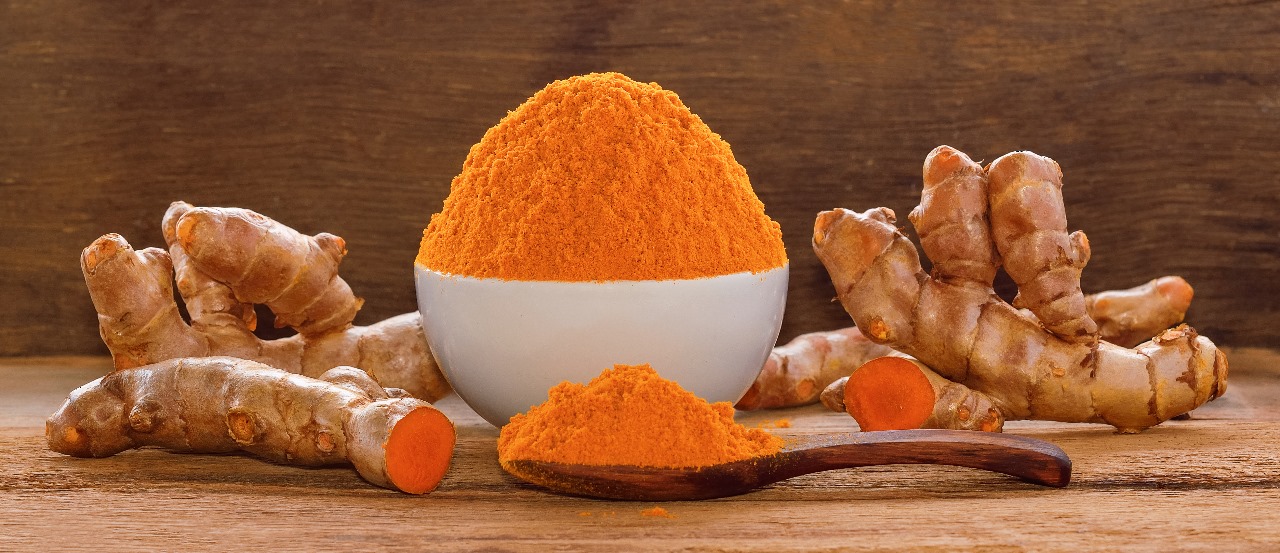
Turmeric Vs. Curcumin: Can You Take Both of Them?
We can use turmeric and curcumin together. Turmeric and curcumin are often used interchangeably, but they are not entirely the same. In this article, we will explore the differences between the two, the benefits each one offers, and how combining them can provide health benefits for us.
What are Turmeric and Curcumin?
- Turmeric – a plant belonging to the ginger family, is widely known and used as a spice in Asia, especially in India, China, etc. It is often heard of and recognized for its role in coloring and flavoring curry dishes. Notably, turmeric is commonly known as an herb in traditional medicine.
- Curcumin is well-known for its strong anti-inflammatory and antioxidant effects. It helps reduce symptoms of chronic inflammation, such as arthritis and supports slowing down the aging process by reducing oxidative stress in the body.
- In an experiment on diabetic rats, the group that was fed a diet with curcumin supplements showed positive improvements. After 6 weeks, rats in the curcumin group maintained better antioxidant levels and significantly reduced inflammation markers like IL-1β, VEGF, and NF-kB (which usually increase with inflammation). Although curcumin didn’t significantly lower blood sugar levels, its effect on controlling inflammation markers and protecting cells was evident [1].
Common Benefits of Turmeric and Curcumin
- Turmeric offers many health benefits. One notable benefit of turmeric is its ability to prevent diabetes. This has been demonstrated through a study with mice. [2]. Moreover, it also supports digestive health, enhances immune function, etc. Because of these benefits, turmeric is not only a spice used in cooking but is also regarded as a common herb in medicine.
- As for curcumin, its most significant effect is its anti-inflammatory properties, skin beautification, etc. In particular, we are aware of curcumin’s effects on gastrointestinal-related diseases. Furthermore, it has an impact on the brain and memory. Therefore, this compound has been heavily exploited for the production of health-supporting supplements.
Turmeric Vs. Curcumin: How Do They Differ from Each Other?
As we have just explored above, both turmeric and curcumin offer many health benefits. However, to avoid confusion, we need to distinguish between them. So, how do turmeric and curcumin differ?
Benefits
- Turmeric and curcumin each have distinct benefits, even though curcumin is the main compound found in turmeric.
- Turmeric is known for its properties, as it contains many other beneficial compounds besides curcumin. The benefits of turmeric include its ability to reduce inflammation, support overall health, and promote digestive health, etc.
Side Effects
As for turmeric, it is considered safe since it comes from nature. However, caution should be exercised during use, as excessive consumption may lead to stomach pain.
Regarding curcumin, although its safety has been validated, some unwanted side effects have been recorded. In one study, 7 participants used doses ranging from 500 mg to 12,000 mg over 72 hours and experienced symptoms such as diarrhea, headaches, rashes, and yellow-colored stools. [4]. Additionally, another study showed that a participant who used between 0.45 g and 3.6 g of curcumin daily for 1 to 4 months reported feelings of nausea and diarrhea, etc. [5].
Turmeric Vs Curcumin: Which is Better to Choose?
When it comes to choosing between turmeric and curcumin, it depends on each person’s needs and usage goals. Turmeric, as a spice, contains many compounds and can be naturally ingested through food (it can be absorbed by being processed into meals and beverages). This method is suitable for those who do not prefer to take medications and whose symptoms are mild, only needing to supplement nutrients through dietary intake.
Curcumin, on the other hand, is more suitable for those looking to treat inflammation at higher doses. Curcumin will support your health better for chronic inflammatory conditions. Therefore, in this case, choosing high-dose curcumin supplement products would be more appropriate.
Can You Take Both Turmeric and Curcumin?
Of course, we can use both turmeric and curcumin together. Combining the two can provide optimal benefits for your health. So far, there have been no reported cases of adverse reactions between turmeric and curcumin. Using them together can enhance antioxidant and anti-inflammatory capabilities and provide more comprehensive health support. However, it is essential that when using them, you consult with a health professional regarding the dosage, and you should closely examine the ingredient list of products containing curcumin to ensure that you are not allergic to any of its components.
How to Take Turmeric and Curcumin Together?
There are many methods to use both together.
- First, you can incorporate turmeric powder into your daily diet, such as in smoothies, soups, curries, etc. Additionally, you can use a curcumin supplement (following the dosage instructions provided by the manufacturer) after meals.
- A more optimal method is to choose a supplement that contains both turmeric and curcumin. Currently, there are several supplements available on the market that can meet this need, such as Turmeric Curcumin with Black Pepper, etc. This method will be very suitable for busy individuals who do not have time to prepare too many things, such as cooking.
Where to Buy Turmeric and Curcumin Supplements?
When discussing where to buy reputable turmeric and curcumin supplements, we need to choose truly trusted brands. You might consider Vinatura Store, which provides high-quality products that optimize health benefits.
One standout product line from Vinatura Supplements is the Turmeric Curcumin with Black Pepper product. This supplement combines turmeric and curcumin, significantly enhancing the absorption of curcumin in the body. This combination can provide powerful anti-inflammatory and antioxidant effects, making it an excellent and reliable choice for everyone. Additionally, this product contains black pepper, which helps increase the bioavailability of curcumin. This is the perfect choice.
Conclusion
Through this article, we can see that both turmeric and curcumin offer significant health benefits, but they still have their distinct differences. Using both is entirely possible, but it is advisable to consult with a specialist and have appropriate methods of use to avoid unwanted side effects. Finally, when choosing supplement products, it is essential to select those from reputable brands to avoid health risks.









